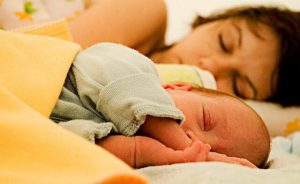A new study may leave you thinking twice about how long your newborn rooms with you.
Running counter to current guidelines, the study found that babies who slept in their parents’ rooms snoozed for shorter durations than those who slept independently. The study, appearing in the journal Pediatrics, also found that babies who roomed in for a year had sleep deficits that lasted into the toddler years.

In assessing the sleep patterns of 230 mothers and their babies, the study findings oppose current recommendations from the American Academy of Pediatrics (AAP), which advise that young children sleep in their parents’ rooms for a full year.
“The AAP recommendation to room-share until the age of 1 year conflicts with sleep expert guidance, which recognizes developmental changes that occur over the first year,” write the researchers, led by Dr. Ian Paul, a pediatrician at Penn State University.
The AAP guidelines intend to boost the safety of young children while sleeping, especially in regard to sudden infant death syndrome (SIDS). But the new findings throw the assumption — that rooming in is safer — into question.
Related: Swimming Lessons May Help Babies Stand Sooner
“The recommendation to room-share until the age of 1 year is not evidence-based for the prevention of SIDS, given that 90 [percent] of these tragedies occur before the age of 6 months,” write the study authors.
Assessing the Details
The researchers tracked sleeping habits among babies at 4 months, 9 months, 12 months and 30 months, comparing the quality of sleep with whether the babies stayed in their parents’ rooms or moved into their own space.
At 4 months of age, babies who slept independently had improved “sleep consolidation,” or longer stretches of sleep. Overall, independent sleepers outlasted their rooming-in peers by 46 minutes for consecutive sleep time.
What’s more, the researchers found that by 9 months of age, “significant differences in nighttime sleep duration emerged between groups.”

Babies who left their parents’ rooms at 4 months slept an extra 40 minutes per night compared to babies that roomed in, and an extra 26 minutes compared to babies that left the nest at 9 months.
“Although night wakings, night feedings, and odds of being fed back to sleep overnight did not differ among groups at 9 months of age, total daily sleep duration was longest among early independent sleepers,” report the study authors.
The researchers surmise that moving children out of their parents’ room early may help stave off distress when the baby has a greater realization a few months later in life.
Related: Toddlers May Sleep Less From Using Mobile Devices
“The suggestion that parents wait to move the infant out of their bedroom until the end of the first year, when separation anxiety is normative and increasing, is likely to result in frustrated parents and unhappy infants. It also conflicts with other data that room-sharing is associated with more sleep disruption for mothers,” write the study authors.
The study also found that, after 30 months, babies that slept independently as early as 9 months slept an average of 45 minutes longer per night than babies that still slept in their parents’ room at 9 months.
“Clinicians may encourage parents to establish independent sleep environments … during the middle of the first year to promote healthy and sustainable sleep patterns before the typical onset of separation anxiety later in the first year,” conclude the researchers.
Richard Scott is a health care reporter focusing on health policy and public health. Richard keeps tabs on national health trends from his Philadelphia location and is an active member of the Association of Health Care Journalists.


![How To: ‘Fix’ Crepey Skin [Watch]](https://cdn.vitalupdates.com/wp-content/uploads/2017/05/bhmdad.png)












